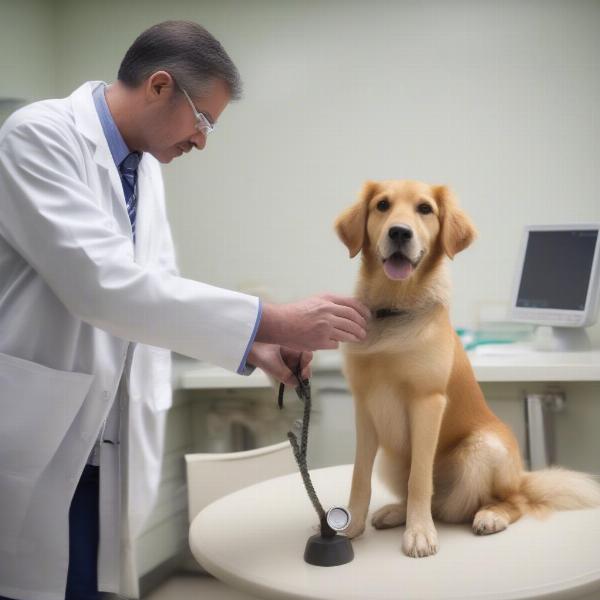Dog dry heaving and coughing can be alarming for any pet owner. Is it a simple cough or something more serious? This article will help you understand the potential causes, when to seek veterinary attention, and how to best support your furry friend. We’ll cover everything from kennel cough and heart conditions to allergies and even foreign objects.
Understanding the Difference: Coughing vs. Dry Heaving
While both coughing and dry heaving can be symptoms of various conditions, they are distinct actions. A cough is the forceful expulsion of air from the lungs, often sounding dry, wet, or honking. Dry heaving, also known as retching, involves contractions of the abdominal muscles, similar to vomiting, but without producing anything. Recognizing the difference is crucial for accurately describing your dog’s symptoms to your vet.
Common Causes of Dog Dry Heaving and Coughing
Several factors can contribute to dog dry heaving and coughing. Some common causes include:
- Kennel Cough: This highly contagious respiratory infection often presents with a harsh, dry, and persistent cough, sometimes accompanied by gagging or retching.
- Heart Disease: Coughing, especially after exercise or at night, can be a symptom of heart problems in dogs. Dry heaving may occur in advanced cases.
- Allergies: Just like humans, dogs can experience allergies to various environmental factors like pollen, dust, and mold, leading to coughing and sometimes gagging.
- Foreign Object: If your dog has inhaled a foreign object, it can cause both coughing and retching as the body attempts to expel it.
- Tracheal Collapse: This condition, common in small breeds, involves the weakening of the trachea, leading to a distinctive honking cough and sometimes gagging.
- Gastrointestinal Issues: While less common, gastrointestinal problems like bloat or esophageal reflux can also cause dry heaving and coughing.
When to See a Vet
 Dog being examined by a veterinarian
Dog being examined by a veterinarian
If your dog is experiencing persistent or severe dry heaving and coughing, it’s essential to seek veterinary attention immediately. Any difficulty breathing, lethargy, loss of appetite, or other concerning symptoms should be addressed promptly.
Home Care and Management
While professional veterinary care is crucial, there are some things you can do at home to support your dog:
- Keep your dog hydrated: Offer fresh water frequently.
- Provide a comfortable environment: Ensure a quiet, stress-free space for your dog to rest.
- Use a humidifier: Adding moisture to the air can help soothe irritated airways.
- Avoid irritants: Keep your dog away from smoke, dust, and strong cleaning products.
Why is My Dog Dry Heaving?
If your dog is only dry heaving and not coughing, it could be related to gastrointestinal issues like nausea, bloat, or ingestion of a non-food item. why is my dog dry heaving explores these possibilities further.
Is Your Dog Coughing and Dry Heaving?
A combination of coughing and dry heaving often points to respiratory issues, but it’s essential to rule out other potential causes. dog is coughing and dry heaving provides a detailed look at the various conditions that can cause both symptoms.
My Dog is Coughing and Sneezing – Could it be Related?
While coughing and sneezing can occur together, they might indicate different underlying problems. my dog is coughing and sneezing discusses the potential connection between these two symptoms.
Conclusion
Dog dry heaving and coughing can signal various health concerns, from mild infections to more serious conditions. Recognizing the difference between coughing and retching, understanding the potential causes, and knowing when to seek professional help is crucial for ensuring your dog’s well-being. Don’t hesitate to contact your veterinarian if you’re concerned about your dog’s health. Early diagnosis and treatment can significantly improve the outcome.
FAQ
- Can stress cause dry heaving in dogs? Yes, stress and anxiety can sometimes lead to gastrointestinal upset, including dry heaving.
- Is dog dry heaving contagious? The contagiousness depends on the underlying cause. For example, kennel cough is highly contagious, while allergies are not.
- What home remedies can I use for my dog’s cough? While home remedies like honey can soothe a mild cough, it’s important to consult your vet before administering any at-home treatments.
- How can I prevent my dog from getting kennel cough? Vaccination is the most effective way to prevent kennel cough.
- Can dry heaving be a sign of a serious problem? While it can be a symptom of something minor, it can also indicate a serious issue, so it’s best to consult a vet.
- What does a honking cough in a dog mean? A honking cough can be a sign of tracheal collapse, particularly common in smaller breeds.
- When should I be concerned about my dog’s dry heaving? If your dog is dry heaving frequently, seems distressed, has other symptoms, or the dry heaving persists, you should consult a vet.
Related Articles on ILM Dog
About ILM Dog
ILM Dog is your trusted international resource for all things dog-related. We offer expert advice on breeds, health, training, nutrition, grooming, and much more, helping dog owners worldwide provide the best possible care for their furry companions. Whether you’re a seasoned dog owner or just starting out, we provide practical, reliable information to guide you every step of the way. Contact us today for personalized advice: Email: [email protected], Phone: +44 20-3965-8624.